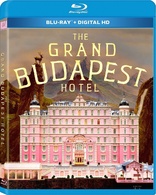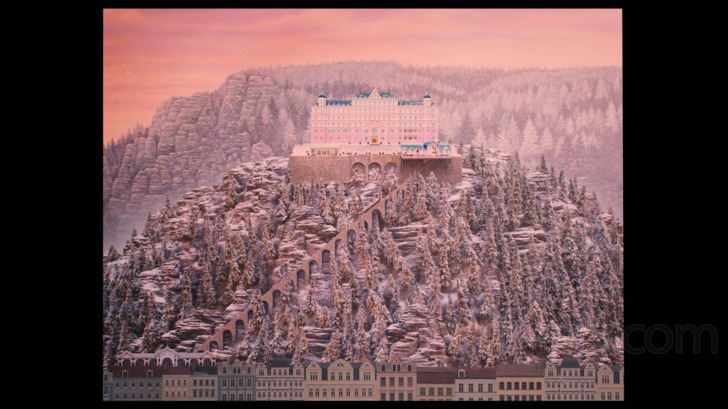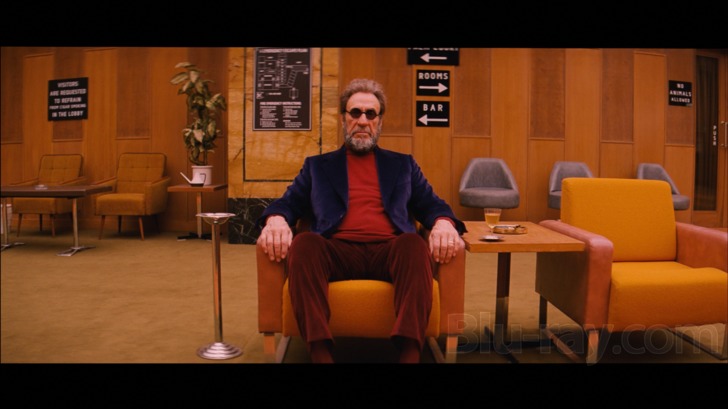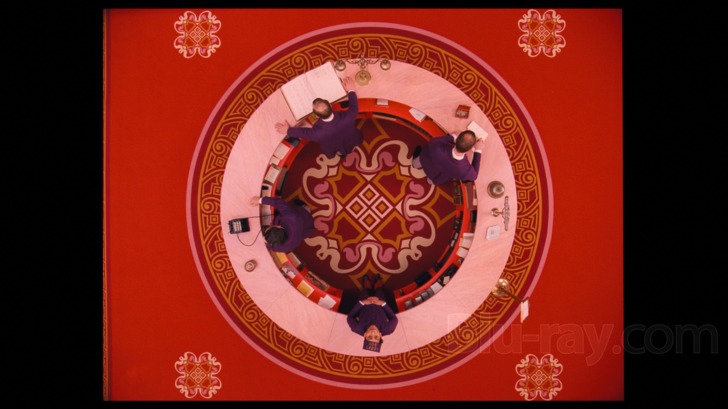The Grand Budapest Hotel Blu-ray Movie
HomeThe Grand Budapest Hotel Blu-ray Movie 
Blu-ray + UV Digital Copy20th Century Fox | 2014 | 100 min | Rated R | Jun 17, 2014

Movie rating
8.3 | / 10 |
Blu-ray rating
| Users | 4.5 | |
| Reviewer | 4.5 | |
| Overall | 4.5 |
Overview
The Grand Budapest Hotel (2014)
The film recounts the adventures of Gustave H., a legendary concierge at a famous European hotel between the wars, and Zero Moustafa, the lobby boy who becomes his most trusted friend.
Starring: Ralph Fiennes, F. Murray Abraham, Mathieu Amalric, Adrien Brody, Willem DafoeDirector: Wes Anderson
| Drama | 100% |
| Dark humor | 45% |
| Period | 44% |
| Comedy | Insignificant |
| Adventure | Insignificant |
Specifications
Video
Video codec: MPEG-4 AVC
Video resolution: 1080p
Aspect ratio: 2.30:1, 1:82:1, 1.33:1
Original aspect ratio: 2.39:1, 1.85:1, 1.33:1
Audio
English: DTS-HD Master Audio 5.1 (48kHz, 24-bit)
Spanish: Dolby Digital 5.1 (448 kbps)
French: DTS 5.1 (48kHz, 24-bit)
Portuguese: Dolby Digital 5.1
Russian: DTS 5.1
Czech: Dolby Digital 5.1
Hungarian: Dolby Digital 5.1 (448 kbps)
Polish: Dolby Digital 5.1
Turkish: Dolby Digital 5.1
All DD dubs are 448kbps, both DTS dubs are at 48kHz, 24-bit.
Subtitles
English SDH, French, Portuguese, Spanish, Arabic, Bulgarian, Croatian, Czech, Dutch, Estonian, Greek, Hebrew, Hungarian, Icelandic, Latvian, Lithuanian, Mandarin (Simplified), Polish, Romanian, Russian, Serbian, Slovak, Slovenian, Turkish, Ukrainian
Discs
50GB Blu-ray Disc
Single disc (1 BD)
UV digital copy
Packaging
Slipcover in original pressing
Playback
Region free
Review
Rating summary
| Movie | 4.5 | |
| Video | 5.0 | |
| Audio | 4.5 | |
| Extras | 2.5 | |
| Overall | 4.5 |
The Grand Budapest Hotel Blu-ray Movie Review
Check in ASAP.
Reviewed by Jeffrey Kauffman June 9, 2014Sprinkled throughout Europe are any number of hidden gems for lodging, many of them incredibly opulent and harkening back to a gilded era of almost exaggerated luxury and impeccable customer service. Many of these establishments have equally ostentatious restaurants which in some cases at least offer almost an embarrassment of riches in terms of baked good like cakes and pastries. Imagine being a visitor at one of these redolent facilities, sitting back and being served one sugary morsel after another until you near the point of bursting and you might have a slight idea of the dense but sweet offerings that Wes Anderson has in store for filmgoers checking into The Grand Budapest Hotel. The Grand Budapest is not in fact in Hungary as one might expect but instead perched atop an improbably precarious mountaintop in the fictional republic of Zubrowska. It’s a six or seven layer cake of a hotel, pink and rose colored and existing in its own sugary ambience seemingly removed from the vagaries of time. Time is actually a rather fluid element in this latest Anderson film, for within just the first few minutes this sometimes intentionally twee filmmaker careens the viewer through several different eras, unfolding an interlocking series of flashbacks that reside within each other like nesting dolls. After a brief prelude that sees a young girl with a Grand Budapest Hotel book staring at a statue of the book's author, that author himself (Tom Wilkinson) begins to narrate his adventures at The Grand Budapest in the late sixties, when the grand structure had already begun to fall into a state of dissolution from which it would never completely recover. This author (now played by Jude Law) meets the hotel’s owner, the enigmatic Zero Moustafa (F. Murray Abraham), quickly befriending the man and relaxing over an perfectly crafted multicourse dinner as Zero regales the author with how he came to own the motel. That finally sets the film zinging back to yet another era, the early thirties, where a now young Zero (Tony Revolori) begins working at The Grand Budapest under the natty aegis of the establishment’s all knowing, all seeing concierge, Monsieur Gustave H (Ralph Fiennes). For film lovers who often lament the dearth of storytelling in a lot of contemporary film, there’s enough pure tale spinning in just the opening few minutes of The Grand Budapest Hotel to provide a rather filling main course. The fact that the film actually continues spinning out yarn after yarn, eventually more or less centering on a plot to deprive Gustave H of an inheritance, is testament to the fact that Anderson, for all his excesses, simply refuses to deal in cut and paste screenwriting. It’s an exceptionally concentrated approach that almost gluts the screen with an outré assortment of characters and situations, all unspooling in equally jam packed sets where so many bizarre accoutrements fill the frame that one almost wants to manically pause the film just to be able to take it all in.

Wes Anderson’s often fairly fussy directorial approach might seem to be tonally at odds with the freewheeling ambience of screwball comedy, but in essence, that’s more less exactly what The Grand Budapest Hotel turns out to be. In a typically Andersonian way, however, some of the genre’s tropes have been twisted to the point that they’re almost unrecognizable. While there’s still the whiplash pace and completely bizarre occurrences that tend to be part and parcel of screwball, the film posits a male pair at its center, with Fiennes’ slightly uptight and more than occasionally foul mouthed Gustave H taking the place of eccentric millionairesses like Katharine Hepburn’s Susan Vance in Bringing Up Baby. That leaves the somewhat hapless but ultimately resourceful young Zero to act as a wide eyed foil for the more wordly and sophisticated older character. The sense of barely controlled chaos that tends to inform a lot of screwball is more than evident throughout The Grand Budapest Hotel both in terms of its plot (which tends to unfold as if it suffered from attention deficit disorder) and even Anderson’s filming style, which frequently features cameras cartwheeling through sets to suddenly whip pan to whatever Anderson wants us to focus on in that particular moment.
While a lot of screwball tends to feature more or less traditional romantic elements between seemingly mismatched characters, here Anderson traffics in more questionable formulations (Gustave H evidently has a habit of bedding the elderly wealthy women who frequent The Grand Budapest, and in fact the death of one of them is what sets the main thrust of the plot into motion) as well as making the hotel itself the ultimate object of both Gustav and Zero’s affections. It’s a breathtaking realignment of traditionally accepted screwball elements, but just another example of how insouciant Anderson’s construction is here. And no mere verbal or written précis can hope to adequately convey how rich Anderson’s visual sense is in the film, something that elevates The Grand Budapest Hotel to a level that seems to echo the “actual” hotel’s mountaintop domain.
Anderson also plays with his characters, repeatedly defying the audience’s expectations. This is probably nowhere more clear than with regard to Gustave H himself. This is a man who seems to embody culture, sophistication and the elegant touch of supreme customer service. And yet again and again Anderson has Gustave lapse into hilariously profane language, almost as if he suffered from Tourrette’s. It’s an obviously intentional mashup of the highbrow with the lowest common denominator and it repeatedly pulls the viewer up by perhaps arched eyebrows, offering a dialogue based analogy to the fact that the once resplendent Grand Budapest may itself ultimately give way to a more mundane reality.
While the bulk of The Grand Budapest Hotel is centered firmly around the odd but endearing relationship between Gustave and Zero, as with most Anderson films, there is a veritable glut of colorful supporting characters teeming around the edges of the frame. These include everyone from the soon deceased doyenne (played by Tilda Swinton) whose death sends Gustave into a mad scramble to preserve what initially seems like an unexpected inheritance but soon turns into an actual life or death struggle, to Adrien Brody as the woman's scheming son, to Willem Dafoe as a cartoonish henchman out to do Gustave in, to Edward Norton as an immaculate military officer who first meets Gustave and Zero on a train but who ends up taking possession of The Grand Budapest once the firestorm of World War II is sparked, to Saoirse Ronan as a pastry chef who captures young Zero's eye and whose culinary skill later proves to come in handy once Gustav is in trouble. Jeff Goldblum, Bill Murray, Harvey Keitel and several other notables wander through the film at various points injecting even more wackiness in nicely detailed semi-cameos. All of the performances are suitably quirky, with an especially strong turn by newcomer Tony Revolori as the young Zero.
The Grand Budapest Hotel serves notice that Anderson is completely in control of his cinematic universe, no matter how dense the presentation may ultimately become. This is a film that marauds through various eras, storylines and even aspect ratios without a second thought, but rather remarkably with a completely clear head and equally pristine staging that is never even slightly confusing. It’s a testament to a writer and director who resolutely refuses to play by accepted rules, instead constructing his own magnificent artifice which is totally distinctive and unique. In fact, Anderson’s Grand Budapest Hotel is rather like its titular facility—a remarkable construct that literally has to be seen to be believed.
The Grand Budapest Hotel Blu-ray Movie, Video Quality 

The Grand Budapest Hotel is presented on Blu-ray courtesy of 20th Century Fox Home Entertainment with an AVC encoded 1080p transfer in a rather bewildering array of aspect ratios (the bulk of the main reminiscence is in 1.33:1). (Note the 21st screenshot included with this review which alerts viewers to set their monitors to 16X9, surely one of the few times that particular warning has shown up on a Blu-ray.) Anderson and his cinematographer Robert D. Yeoman are obviously in a playful mood throughout this film, doing things like framing the sixties' material in a warped fisheye lens manner. Quite a bit of the film has been oddly color graded with a purplish hue overlaying the image, which can make flesh tones look slightly odd at times. Contrast is strong throughout the presentation, but the purplish tint sometimes adds just a hint of that color to the blacks. Despite some of these gambits, the presentation here is stellar all around, with exceptional fine detail revealing items like pill on costumes and even the very slightly plastic look of some of the makeup used to age Swinton. Anderson indulges in patently artificial looking elements like establishing shots of the hotel which intentionally resemble illustrations and which can appear soft when compared to the bulk of the live action footage. The film utilizes its actual European locations marvelously, with an almost candy coated approach that is ornate and exotic and which pops magnificently in high definition. The film rests comfortably on a BD-50 with no problematic artifacts to report.
The Grand Budapest Hotel Blu-ray Movie, Audio Quality 

The Grand Budapest Hotel's lossless DTS-HD Master Audio 5.1 mix is quite subtle at times but is as aurally stuffed full of immersive events as the visual side of things. While narration and voiceover are understandably anchored front and center, there is fine attention to detail in terms of great placement of ambient environmental sounds that wonderfully recreates the cavernous interior of the hotel, whether it be bustling with activities in the early 1930s or nearly vacant in the late 1960s. Several of the film's key sequences are rather manic, including some of Gustave's attempts to outrun his adversaries, and in these moments the sound design becomes almost frenetic, but never overpowering. A charming musical score by Anderson's frequent collaborator Alexandre Desplat is effectively splayed through the surrounds. Dialogue is very cleanly presented on this track which boasts great fidelity and no issues of any kind to report.
The Grand Budapest Hotel Blu-ray Movie, Special Features and Extras 

- Bill Murray Tours the Town (1080p; 4:18) is a charming behind the scenes featurette which follows Murray around the locations where the film as shot.
- Vignettes (1080p; 9:00) is a selection of three short pieces featuring things like Tom Wilkinson as the author giving a slideshow on his history.
- Promotional Featurettes include:
- The Making of The Grand Budapest Hotel (1080p; 18:08)
- Cast (1080p; 3:24)
- Wes Anderson (1080p; 3:46)
- Stills Gallery (1080p)
- Theatrical Trailer (1080p; 2:26)
The Grand Budapest Hotel Blu-ray Movie, Overall Score and Recommendation 

In a world of cookie cutter entertainments, it is beyond refreshing to encounter something like The Grand Budapest Hotel, a deliberately dense offering that feels like a six or seven course meal comprised almost entirely of sweet desserts. Anderson's ultimate point in the film may be a bit vague (is it simply the melancholy nostalgia that frequently accompanies memories of a brighter time?), and so his destination might not seem particularly profound, but the journey itself is simply magnificent, full of bizarre characters and situations and always infused with his very dry, wry sense of humor. This is a film which virtually demands repeated viewings, for any given moment has so much occurring in the frame that it can become difficult to track it all. Luckily this Blu-ray is a first rate presentation which will make those repeated viewings a pleasure. You've never seen anything remotely like The Grand Budapest Hotel, and as far as I'm concerned, that's a very good thing indeed. Highly recommended.
Similar titles
Similar titles you might also like

Birdman
Birdman or (The Unexpected Virtue of Ignorance)
2014

Moonrise Kingdom
2012

The Master
2012

The Royal Tenenbaums
2001

The Grapes of Wrath
1940

A Serious Man
2009

The Life Aquatic with Steve Zissou
2004

Once Upon a Time in Hollywood 4K
2019

The Darjeeling Limited
2007

The Irishman
2019

Inglourious Basterds 4K
2009

Modern Times
1936

The Descendants
2011

Dom Hemingway
2013

Carnage
2011

Three Billboards Outside Ebbing, Missouri
2017

The Sting
1973

To Rome with Love
2012

Listen Up Philip
2014

In Dubious Battle
2016
